Text
Free Online Language Courses

Here is a masterpost of MOOCs (massive open online courses) that are available, archived, or starting soon. I think they will help those that like to learn with a teacher or with videos. You can always check the audit course or no certificate option so that you can learn for free.
American Sign Language
ASL University
Arabic
Arabic for Global Exchange (in the drop down menu)
Arabic Without Walls
Intro to Arabic
Madinah Arabic
Moroccan Arabic
Catalan Sign Language
Intro to Catalan Sign Language
Chinese
Beginner
Basic Chinese
Basic Chinese I. II, III, IV , V
Basic Mandarin Chinese I & II
Beginner’s Chinese
Chinese for Beginners
Chinese Characters
Chinese for HSK 1
First Year Chinese I & II
HSK Level 1
Mandarin Chinese I
Mandarin Chinese for Business
More Chinese for Beginners
Start Talking Mandarin Chinese
UT Gateway to Chinese
Chino Básico (Taught in Spanish)
Intermediate
Chinese Stories
Intermediate Business Chinese
Intermediate Chinese Grammar
Dutch
Introduction to Dutch
English
Online Courses here
Resources Here
Faroese
Faroese Course
Finnish
A Taste of Finnish
Basic Finnish
Finnish for Immigrants
Finnish for Medical Professionals
French
Beginner
AP French Language and Culture
Basic French Skills
Beginner’s French: Food & Drink
Diploma in French
Elementary French I & II
Français Interactif
French in Action
French for Beginners
French Language Studies I, II, III
French:Ouverture
Intermediate & Advanced
French: Le Quatorze Juillet
Passe Partout
La Cité des Sciences et de Industrie
Frisian
Introduction to Frisian (Taught in English)
Introduction to Frisian (Taught in Dutch)
German
Beginner
Beginner’s German: Food & Drink
Conversational German I, II, III, IV
Deutsch im Blick
Diploma in German
Rundblick-Beginner’s German
Advanced
German:Regionen Traditionen und Geschichte
Landschaftliche Vielfalt
Hebrew
Biblical Hebrew
Know the Hebrew Alphabet
Teach Me Hebrew
Hindi
A Door into Hindi
Business Hindi
Virtual Hindi
Icelandic
Icelandic 1-5
Indonesian
Learn Indonesian
Irish
Introduction to Irish
Italian
Beginner
Beginner’s Italian: Food & Drink
Beginner’s Italian I
Introduction to Italian
Italian for Beginners 1 , 2, 3 , 4 , 5, 6
Intermediate & Advaned
Intermediate Italian I
Advanced Italian I
La Commedia di Dante
Japanese
Genki
Japanese JOSHU
Japanese Pronunciation
Sing and Learn Japanese
Tufs JpLang
Kazakh
A1-B2 Kazakh (Taught in Russian)
Korean
Beginner
First Step Korean
How to Study Korean
Learn to Speak Korean
Pathway to Spoken Korean
Intermediate
Intermediate Korean
Nepali
Beginner’s Conversation and Grammar
Norwegian
Introduction to Norwegian
Norwegian on the Web
Portuguese
Curso de Português para Estrangeiros
Pluralidades em Português Brasileiro
Russian
Beginner
Easy Accelerated Learning for Russian
Advanced
Reading Master and Margarita
Russian as an Instrument of Communication
Siberia: Russian for Foreigners
Spanish
Beginner
AP Spanish Language & Culture
Basic Spanish for English Speakers
Beginner’s Spanish:Food & Drink
Fastbreak Spanish
Introduction to Spanish
Restaurants and Dining Out
Spanish for Beginners
Spanish for Beginners 1, 2, 3, 4, 5, 6
Spanish Vocabulary
Intermediate
Spanish:Ciudades con Historia
Spanish:Espacios Públicos
Advanced
Corrección, Estilo y Variaciones
Leer a Macondo
Spanish:Con Mis Propias Manos
Spanish: Perspectivas Porteñas
Swedish
Intro to Swedish
Swedish Made Easy 1, 2, & 3
Ukrainian
Read Ukrainian
Ukrainian Language for Beginners
Welsh
Beginner’s Welsh
Discovering Wales
Multiple Languages
Ancient Languages
More Language Learning Resources & Websites!
Last updated: March 1, 2017
214K notes
·
View notes
Text
Everyday activities in Spanish
If i miss some, please tell me. Added a small example.
Wake up - Despertar - Yo despierto muy temprano.
Make the bed - Hacer la cama - Siempre hago mi cama al despertar.
Brush teeth - Cepillar dientes - Debes cepillar tus dientes todos los dias.
Get dressed - Vestirse - ¡Mejor me visto rapido!
Wash face - Lavar cara - Lavate la cara, aun tienes lagañas. (That “sand” in your eyes)
Ask bless - Pedir la bendicion - Mi mamá se molesta si no le pido la bendicion en la mañana .
Make breakfast - Hacer el desayuno - Los sabados te toca a ti hacer el desayuno.
Eat breakfast - Desayunar - Es mejor desayunar en familia .
Go to school/work - Ir a la escuela/el trabajo - Debo apresurarme en ir a la escuela/el trabajo.
Drive - Conducir - Mi padre conduce muy lento.
Go home - Ir a casa - Mamá, ya quiero irme a casa.
Feed the dog/cat - Dar de comer al perro/gato - Al llegar a casa le doy de comer al gato.
Make dinner- Hacer el almuerzo - Mi mamá debe ya de estar haciendo el almuerzo.
Eat dinner - Almorzar - Adoro almorzar macarrones con queso.
Put the table - Poner la mesa - Mis hermanos y yo ponemos la mesa.
Wash dishes - Lavar platos - Mi hermana debe lavar los platos hoy.
Do homework - Hacer tarea - No puedo hacer tarea con tan poca luz.
Take a nap - Tomar una siesta - No hay nada mas saludable que tomar una buena siesta.
Eat snack - Merendar/comer un bocadillo - Es media noche, un momento perfecto para merendar/comer un bocadillo.
Work out - Ejercitarse - Me ejercito tres veces a la semana.
Check social network - Revisar red social - Siempre estoy revisando facebook en mi celular.
Chat - Mensajear/Chatear - He estado chateando con una chica nueva.
Go to sleep - Ir a dormir - Necesito descansar, ya me voy a dormir.
2K notes
·
View notes
Text
21 Spanish filler words

Spanish Filler Words
1) Bueno: Well
Ex: “bueno, no importa” = “well, it doesn’t matter”
2) O sea / Es decir: I mean, in other words, that is to say
Ex: “El jefe no me ha hablado todavía, o sea / es decir, de verdad no sé.” = “The boss hasn’t talked to me yet, so in other words, I don’t really know.”
3) Así que: So, therefore
¿Así que al final fuiste al restaurante? = So you ended up going to the restaurant?
4) Pues: Well
Ex: Pues… no sé, tengo mucho sueño = Well… I don’t know, I’m really tired
5) Mira = Look / look here
Ex: “Mira, sólo digo que a mí no me parece una buena idea.” = “Look, I’m just saying that I don’t think that it is a good idea.”
6) Che: Hey, hey buddy ( mostly used in Argentina but also used in Uruguay and Valencia, Spain)
Ex: “¡Che! ¿Qué tal, hombre?” = “Hey! What’s up, man?”
7) A ver: Let’s see
Ex: A ver… ¿qué podemos hacer esta noche? = Let’s see… what can we do tonight?
8) Vamos a ver: Let’s see
Vamos a ver qué hay para hacer esta noche = Let’s see what there is to do tonight
9. Está bien / Dale = Okay, a synonym of Spanish in Spain is “vale”
Ex: “Mañana te llamo, ¿dale? – ¡Dale! / Está bien.” = “I give you a call tomorrow, okay? – Okay!”
10) Tipo / como = Like
Ex: “Es tipo / como el pie Americano” = “It’s like the American pie”
11) Entonces: So, therefore
Ex: “Entonces, cuando vas a visitar a tu abuela?” = “So, when are you going to visit your grandma?’
12) Este: Uh, umm, ah
Ex: “Sí, este… rompí tu telefono” = “Yeah, umm…I broke your phone”
13) A propósito / por cierto: By the way
Ex: “A propósito, ¿sabes dónde está María?” = “By the way, do you know where Maria is?”
14) Luego: Then (it can also mean “later” in another context)
Ex: “Fui a la farmacia y luego a casa” = “I went to the drugstore and then home.”
15) Por lo menos: At least
Ex: “Por lo menos no te quemaste” = “At least you didn’t burn yourself”
16) ¿Sabes?: You know?
Ex: Es muy importante para mí, ¿sabes? = It’s really important to me, you know?
17) Por fin: Finally, at last
Ex: “¡Por fin! ¡Estás aquí!” = “Finally! You’re here!”
“Por fin, tenemos la tarea de todos.” = “At last, we’ve got everyone’s homework.”
17) Quizás / tal vez: Maybe, perhaps
Ex: “Quizás/ Tal vez no debí haberme comido toda sea comida” = “Maybe I shouldn’t have eaten all that food”
18) Aunque: Although, even though
Ex: “Aunque está lloviendo, voy a ir al gym” = “Even though it’s raining, I’m going to the gym”
19) Además: Moreover, besides, also, and occasionally used as “too”
Ex: “El queso es demasiado suave, demasiado débil, y además huele muy mal.” = “Cheese is too soft, too weak, and besides, it smells terrible.”
20) Sin embargo: However, nonetheless, nevertheless
“Entiendo que el queso no es tan fuerte como el acero, pero sin embargo voy a hacer un carro con él.” = “I understand that cheese isn’t as strong as steel, but nevertheless I’m going to make a car out of it.”
21) De hecho: actually
Ex: “De hecho, nunca vi esta película pero dicen que es digna ser vista.” = “Actually, I’ve never seen that movie, but they say it is worth it.”
11K notes
·
View notes
Text
German TV series/shows
Hello, hello! Since you all seemed to like my posts about German movies, I wanted to share a few German TV series with you (based on series I like and/or I know) so you can improve your German by watching them. Have fun!
Doctor’s Diary (funny and cute, about doctors and nurses, almost all the characters are just GREAT, you’ll ship people so damn hard)
Türkisch für Anfänger (iconic!!!)
You are wanted (cyber crime)
Schloss Einstein (actually a show for teenagers, boarding school, I was obsessed with it when I was younger and I think it’s a good show to improve your German)
K11 - Kommissare im Einsatz (pseudo-documentary about crime stuff)
Niedrig und Kuhnt - Kommissare ermitteln (like K11 but with so many people that you’ll ship with each other)
Wege zum Glück (telenovela, 4 seasons, stuff that your grandma would watch but it is fucking addictive!!! also the villain is SO fucking good and cruel!!!)
Hinter Gittern - Der Frauenknast (basically Orange is the new black of the 90ies in Germany lmao)
KRIMI.DE (a crime show for kids/teens but it’s very nice!)
Simsala Grimm (animated, about fairytales, it’s so cute!!)
Verliebt in Berlin (romance, drama)
2K notes
·
View notes
Text
Changes in Meaning with the Spanish verbs SER and ESTAR
ABIERTO
estar abierto - to be open
ser abierto - to be frank/open
ABURRIDO
estar aburrido - to be bored
ser aburrido - to be boring
AFECTADO
estar afectado - to be affected/bothered by sth
ser afectado - affected/stilted
ATENTO
estar atento - to pay attention
ser atento - to be attentive
BAJO
estar bajo - to be located way down or to be depressed
ser bajo - to be short (in height)
BUENO
estar bueno - to be in good health, to be fine, to taste good, to be hot
ser bueno - to be good, honest; to be a good person
RICO
estar rico - to be tasty
ser rico - to be rich
LISTO
estar listo - to be ready
ser listo - to be intelligent
VIVO
ser vivo - to be astute
estar vivo - to be alive
SEGURO
estar seguro - to be sure
ser seguro - to be confident
FRÍO
estar frío - to be physically cold
ser frío - to be a cold person
GORDO
estar gordo - getting fat/out of shape
ser gordo - to be fat
GRAVE
estar grave - to be in bad health
ser grave - to be serious
INTERSADO
estar interesado - to be interested in sth
ser interesado - to be interested in sth for material reasons
LOCO
estar loco - to be acting crazy
ser loco - to be crazy
LOCO
estar malo - to be ill/to taste bad
ser malo - to be a bad person/thing
MOLESTO
estar molesto - to be upset/annoyed by sth
ser molesto - to be irritating
MUERTO
estar muerto - to be dead
ser muerto - to be boring
NEGRO
estar negro - to be furious
ser negro - to be black
NERVIOSO
estar nervioso - to feel nervous
ser nervioso - to be a nervous person
VERDE
estar verde - to be unripe
ser verde - to be green
VIEJO
estar viejo - to be getting/looking old
ser viejo - to be old
-These are just a few example - send me more good ones!
2K notes
·
View notes
Photo

Here are some podcasts for those of you that learn or speak Spanish. Many you can find on iTunes, on Android using Pocket Casts, or on their own websites/RSS feed. Other podcasts: Arabic| French | German | Italian| Russian| Ukrainian| Eurasia
Language Learning
Accelerated Spanish
Coffee Break Spanish
Discover Spanish
Language Transfer: Complete Spanish
Learn Spanish Daily Podcast
Learning Spanish for Beginners
Light Speed Spanish
Medical Spanish Podcast
Notes in Spanish: Beginner
Notes in Spanish: Intermediate
Notes in Spanish: Advanced
One Minute Spanish
One Minute Latin American Spanish
Real Deal Spanish
Spanish by Choice: Transcripts here.
SpanishPod101
Spanish - SurvivalPhrases
Speak Spanish with Maria Fernandez
Beginner-Advanced Listening
Advanced Spanish with Spanish Obsessed
Español Automático: Includes transcripts.
Españolistos
Hablemos Español (Mexico)
La Casa Rojas: Transcripts can be bought.
Learn Argentinian Spanish
My Spanish Podcasts
News in Slow Spanish (Spain): Includes transcripts.
News in Slow Spanish (Latin America): Includes transcripts.
Notes in Spanish: Gold: Transcripts can be bought.
Podcast en Spanish
Spanishpodcast: Includes transcripts.
SpanishPodcast.net: Includes transcripts.
Show Time Spanish
Unlimited Spanish: Includes transcripts.
Spanish Only
00 Podcast: Movies
Al Filo de la Realidad: Occult, UFO’s, pseudoscience.
Campamento Krypton: Pop culture.
CienciaEs: Science podcasts
Cultura, contracultura, y recontracultura: Culture.
Economía para la Ciudadanía: Economics.
El Amor Después : Relationships and love.
Engadget: Technology.
Es Salud: Health.
Es una Trampa: Star Wars
Fallo de sistema: Sci-fi, comics, movies.
Gameover: Video games.
Histocast: History
Juego de Tronos : Game of Thrones.
La Papa: Answers to unique questions.
La Parroquia: Humor.
La Rosa de los Vientos: Mystery
Lo-Fi: Relationships.
Melomania: Classical music.
Memorias de un Tambor: Spanish history.
Nadie sabe nada: Humor.
Negá Todo : X-files
Nunca Ayudes a Nadie: Productivity
Oh My LOL: Humor
Radio Ambulante: Like This American Life
Radioshock: Random interesting topics.
SBS Radio: News
Señaladores: Literature.
Sexopolis: Sex & sexuality.
Siglo 21: Music.
Son y sabor: Music
Terror Y Nada Más: Horror.
Verne y Wells Ciencia Ficción: Sci-fi and stories.
Argentina Podcastera: Several interesting podcasts from Argentina.
iVoox: Several podcasts can be found here.
Radio Nacional: Several podcasts from Colombia.
RTVE: Several podcasts from Spain that you narrow by category.
You can find waaay more podcasts in Spanish simply by going through Spanish radio stations. I’ve seen podcasts for Pokemon, poetry, geology, and beer. You’re bound to find something you like :D
6K notes
·
View notes
Text


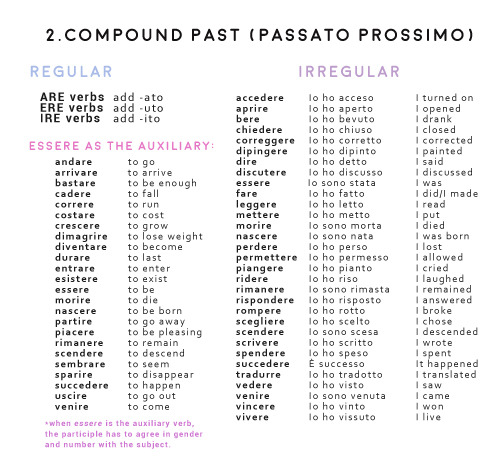

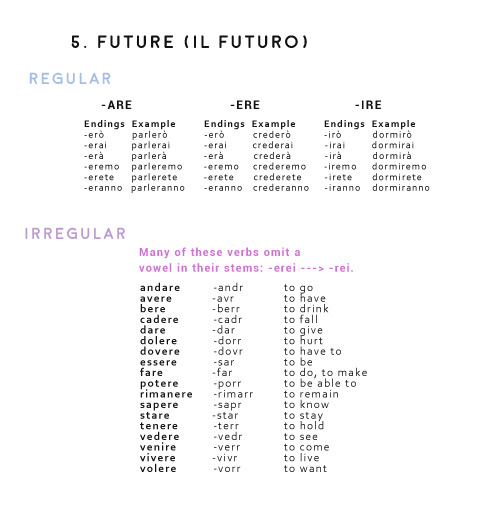





I decided to create this cheat sheet on Italian verbs because the most difficult part of learning romance languages for me has always been all the verb forms and conjugations. The idea (and format!) was inspired by @studypuddles’ post on French verbs, which you can find here.
I combed through for spelling errors & mistakes, but alas some do fall through the cracks, so let me know if you see anything!
Learn more about the Passato Remoto here.
2K notes
·
View notes
Text
Grimms’ Fairy Tales in Spanish - PDFs

The Frog Prince
The Story of the Youth Who Went Forth to Learn What Fear Was
The Wolf and the Seven Young Goats
Rapunzel
Cinderella
Hansel and Gretel
Sleeping Beauty
Little Red Riding Hood
The Fisherman and His Wife
Snow White
Rumpelstikin
The Star-Money
Mother Hulda
The Bremen Town Musicians
Tom Thumb
Hans in Luck
The Oldman and His Grandson
enjoy!
literature
1K notes
·
View notes
Text
language resources
hi guys since i just hit 1k (1.2k now) i decided to make this :) i don’t have a lot for other languages besides Spanish or French, but this is mainly what i have :) THERES LITERALLY NO ORDER TO THIS SORRY
General
website 1 (verbal planet)
worksheets
vocab lists
grammar explanations
free downloads
website 2 (the language gym)
you can choose what tenses you want to be studied on
tests vocab
play games
website 3 (word brewery)
great for vocab and practicing understanding
Spanish
English
Chinese
Arabic
Portuguese
Russian
Japanese
German
French
Italian
Polish
Ukrainian
Korean
Serbian (Latin)
Serbian (Cryillic)
Hungarian
Greek
Swedish
Norwegian
improving vocabulary
how to learn a new language 1+ language masterpost
how to learn languages 2
speed of a language (what is the fastest lang?)
apps for many languages
printable
losing interest in a language class
BaDum!
starting a language journal
language tips
studying tips
free online courses
topics to talk about in ur target lang.
ASL (american sign language)
tips
alphabet
Spanish
conversation vocab
animals
essay vocab 1
essay vocab 2
essay vocab 3
saying hello
saying goodbye
spanish tenses masterpost
nature vocab
mental health vocab
resources 1
resources 2
resources 3
some really random vocab
cual vs que
spanish comics
quick “today i have to” exercise
quick “tomorrow i have to” exercise
reaction phrases
time vocab
que fue explained
alli vs alla
summer vocab
cinema vocab
future indicative examples
para vs por
weather
extra handy vocab for conversations
linking time with actions
more basics
French
resources 1
resources 2
resources 3
resources 4
resources 5
resources 6
Le Passé Composé masterpost
langage-et-linguistique
basics cheat sheet
saying theres no point in french
beautiful vocab
verbs
adverbs
adjectives
be mean in french
animals vocab
weather vocab
slang
small talk
example of studying a song
my study playlist (hon hon)
trees and flowers vocab
im grateful in french
guessing french genders
dog vocab ;)
harry potter in french PDFs
level 3 stuff ( @dehgastudies )
questions + answers vocab
how to learn french
feelings
nighttime vocab
handy vocab for reading articles
travel vocab
essay vocab
places vocab
Italian
guessing italian genders
masterpost
resources
geography/astrology vocab
German
mission berlin game story
slow german
kids game !! easy vocab
language guide
Greek
great resources to begin learning
the basics
modern greek
greek resources
definitive article
key phrases
more basics
greek 101 site
Czech
vocab
Hungarian
vocab
Chinese
stroke order
mandarin verbs
basic words
Romanian
school vocab
appearance vocab
emotions
Polish
astrology vocab
Korean
travel vocab
how to read
korean grammar
how to study korean!
Portuguese
animals
ta falado
oneness
Hebrew
back to school resources
Japanese
learning
basics
household items vocab
clothing items vocab
Norwegian
textbooks based on CEFR levels
head vocab
resources
Vietnamese
resources
resources 2
alphabet
lessons
survival phrases
Welsh
resources !!
8K notes
·
View notes
Text
Determining Gender
Masculine
nouns referring to males: der Vater, der Junge
many nouns ending in -er, -en, or -el: der Lehrer, der Wagen, der Mantel
days, months, seasons: der Montag, der Januar, der Herbst
foreign words with the accent on the last syllable: der Soldat, der Elefant
nouns formed from an infinitive minus the -en: der Besuch, der Lohn
many nouns that form their plural by adding (occasionally an umlaut) always -e: der Brief, der Satz
nouns ending in -ich, -ig, -ismus, -ist, -ling, or -us: der Teppich, der Käfig, der Kommunismus, der Kapitalist, der Lehrling, der Rhythmus
Feminine
nouns that refer to females: die Mutter, die Frau
names of numerals: die Eins, die Hundert
names of many numbers: die Elbe, die Mosel
many nouns ending in -e: die Lampe, die Ernte
nouns ending in -in that identify females in professions: die Lehrerin, die Ärztin
many nouns ending in -a: die Kamera, die Pizza
many nouns that form their plural by -en or -n: die Tante, die Zeitschrift
nouns ending in -ei, -heit, -keit, -ie, -ik, -nz, -schaft, -ion, -tät, -ung, or -ur: die Schweinerei, die Einheit, die Einsamkeit, die Fotografie, die Topik, die Konferenz, die Landschaft, die Position, die Universität, die Prüfung, die Natur
Neuter
diminutive nouns that end in -chen or -lein: das Mädchen, das Röslein
nouns formed from an infinitive: das Einkommen, das Singen
most nouns that end in -nis: das Bekenntnis, das Gedächtnis
many nouns with the prefix Ge-: das Gemälde, das Gelächter
nouns that refer to metals: das Gold, das Silber
nouns that end in -ment: das Regiment, das Experiment
most nouns that form their plural by (occasionally an umlaut) and always -er: das Haus, das Kind
nouns that end in -tel, -tum, or -um: das Viertel, das Königtum, das Gymnasium
707 notes
·
View notes
Text
Spanish Grammar - The Imperative

So I have always found it difficult to wrap my head around all the different forms of the imperative, all the different endings, and all the uses of the imperative in Spanish. For whatever reason, some of it continues to baffle me, whilst other aspects of it have become 2nd nature. Hence, I thought I would make a concise post where I could bring all aspects of the Spanish el imperativo together. So enjoy!!
The imperative, in general, is used to express a command, demand, instruction or wish. However, when using el imperativo, it is important to identify wether you want to use positive imperative or negative imperative, and wether you wish to convey the imperative in a formal or informal tone.
Positive Vs. Negative Imperative
There is a very simple difference between these two concepts in Spanish, as there is in English. Positive imperative expresses a command, demand, instruction, or wish, which is intended to be realised.
For example, in English, the phrase “Eat the apple!” is an example of the positive imperative as you want the apple to be eaten
Conversely, Negative imperative expresses a command, demand, instruction, or wish, which is not intended to be realised.
For example, in English, the phrase “Don’t eat the apple!” is an example of the negative imperative as you do not want the apple to be eaten.
The reason why it is important to remember this concept when using el imperativo is because wether the positive or negative imperative is used impacts on how you conjugate the verb. Let’s see how.
Forming the Negative Imperative
Forming the Negative Imperative in Spanish is very simple to achieve, provided you have a good understanding of the conjugations for the present subjunctive - if not, you might want to scratch up on this first! The following construction is used:
No + present subjunctive
In order to change the subject of the negative imperative, you must therefore change the subject of the present subjunctive accordingly.
The imperative is primarily used using the 2nd person, however the form you chose will depend on the plurality of the subject, and wether you wish to use a formal or informal tone. The following table shows the forms to use

Hence, match the present subjunctive endings of the above forms with the subject you wish to refer to. For Example:
No toques la mesa! = Don’t touch the table! (tú)
No toque la mesa! = Don’t touch the table! (usted)
No toquéis la mesa! = Don’t touch the table! (vosotros)
No toquen la mesa! = Don’t touch the table! (ustedes)
Forming the Positive Imperative
To form the positive imperative, add the following verb-endings to the verb stem:

Note how the usted and ustedes forms are exactly the same as the present subjunctive forms.
Examples of the Positive Imperative in use:
Habla conmigo = Speak to me
Come rápido porque tenemos prisa = Eat quickly as we are in a hurry
Hablad en voz baja = Speak quietly
Escribid enseguida = Write straight away
Unfortunately, however, there are some irregular forms of verbs for the tú form of the positive imperative, all of which must be mesmerised. They are:
Decir = Di
Hacer = Haz
Ir = Ve
Oír = Oye
Poner = Pon
Salir = Sal
Ser = Sé
Tener = Ten
Venir = Ven
Using personal pronouns with the Imperative
In order to use object or reflexive pronouns with the positive imperative, one must simply add the appropriate pronoun to the end of the conjugated verb. If you wish to use an indirect object pronoun and an direct object pronoun at the same time - place the indirect object pronoun first. You must then add a tilde where the stress should normally be.
For example:
¡Levántate! = Get up! (tú)
Hazme el favor de poner la mesa = Lay the table, please
Dimelo ahora mismo = Tell me right now!
Váyase = Go away! (usted)
¡Dénmelos! = Give me them / Give them to me
To use the personal pronouns with the negative imperative, you ust place them immediately before the verb. If both direct and indirect object pronouns are being used at the same time, the indirect object pronoun must come first.
For example:
No te levantes = Don’t get up
¡No se vaya! = Don’t go away
No me los den = Don’t give me them / Don’t give them to me
The First Person Plural Imperative
This refers to the english construction “Let’s….”, for example “Let’s go to the beach!”. It is very simple to form in Spanish, as in order to form it, all you have to do is use the first person plural form of the present subjunctive.
For example:
Hablemos = Let’s talk
No entremos = Let’s not go in
Hagámoslo ahora mismo = Let’s do it right now
Notice how personal pronouns can be implemented right at the end of the conjugated verb, with a tilde used in order to retain the original stress of the word. It also should be noted that in reflexive verbs, the final -s of the nosotros form of the verb is omitted.
For example:
Vámonos = Let’s go
Levantémonos = Let’s get up
Divirtámonos = Let’s have a good time
It also important to note that these forms of the “Let’s…” construction are rarely used in colloquial Spanish. Normally you would use the construction: Vamos a + Infinitive. Use whatever you prefer
The Imperative ‘que’
The Imperative ‘que’ is a very nifty feature of Spanish. It is used at the beginning of a sentence and is immediately followed by the subjunctive, and is used to express a wish or command. You here it frequently in colloquial dialogue and in television, so it’s definitely worth revising!
For example:
¡Que gane el mejor! = May the best man win!
Que espere un momento = Tell him/her/them to wait a minute
Que entren todos = Let them all come in
Hopefully you all find this useful!
The reference for this post is primarily Muñoz, P, and Thacker, P. (2012), A Spanish Learning Grammar, Third Edition, London, however I have added in notes from my Spanish 1B classes at the University of Edinburgh. I do not own the first image.
925 notes
·
View notes
Text
German resources
For anon!
(I’m going to leave out the most obvious ones like Memrise and Duolingo. Feel free to add ones that I’ve missed.)
YouTube:
Deutsch Für Euch
Easy German
Get Germanized
Slow German (also a podcast)
Online Proficiency Tests:
Deutsch Lernen
Transparent
Heidelberg
General Websites:
lyricstraining
DeutscheWelle
Buzzfeed Deutschland
German resources Tumblr tag
My German tag (gotta get that self-promo)
Goethe Institut
deutsch.info
deutschdrang
Internet Polyglot
1000 Most Common German Words
deutsch-perfekt
yourdailygerman
Websites specifically for A1-A2
learn-german-online A1
Goethe Institut A1-A2
longua.org A1
longua.org A2
A1 Vocab list
deutschakademie A2
Websites specifically for B1-B2
B1 vocab list
B2 vocab list
longua.org B1
longua.org B2
german-course-vienna B1
german-course-vienna B2
Websites specifically for C1-C2
longua.org C1
deutschakademie C1
schubert-verlag C1 and here
schubert-verlag C2 and here
Quizlet C1-C2 vocab flash cards
German News/TV
ZDF
ORF
TLC Deutschland
Das Erste
ProSieben
German Music
Disney songs
Rap
Rock
My German playlist
Online German Dictionaries
Linguee
dict.cc
reverso
Duden
Austrian dictionary
Austrian German Glossary
Bavarian dictionary
Colognian dictionary
Swabian - English
Finding people to talk to:
@polyspeak‘s German community list
italki
4K notes
·
View notes
Text
ppl: but why do you wanna learn this language?
me: i don’t understand the question
445 notes
·
View notes
Photo
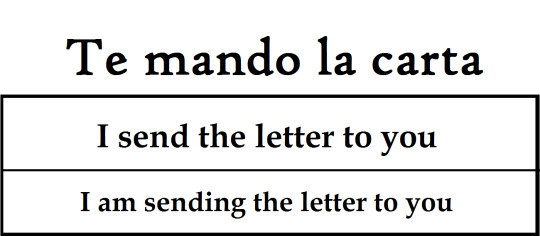
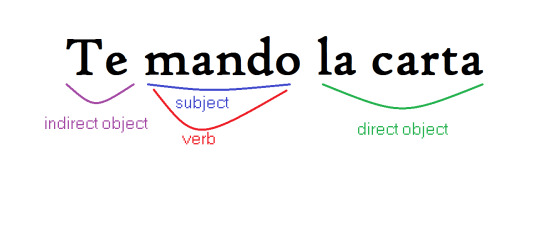



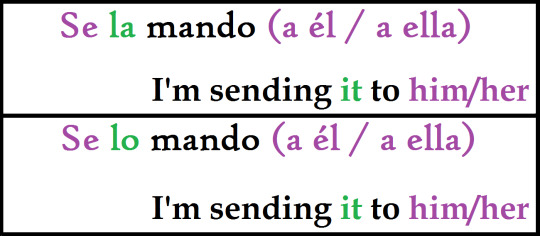


Anatomy of Spanish: An indirect object [objeto indirecto] is typically a person, animate object, or personified object that receives the result of the action. While a direct object is the thing being acted upon, the indirect object is the person or thing that is the recipient of the action.
In the sentence te mando la carta, it is la carta that is the direct object - being acted upon by the subject through the verb. And the te “to you” indicates who the recipient of the action is; “to whom” or “for whom” an action is done. In a case system, an indirect object is typically identified under the “dative” case.
The indirect object pronouns - me, te, le, les, nos, os - are pretty standard and look similar to the direct object pronouns (which are me, te, lo/la, los/las, nos, os).
For an indirect object, you can make it emphatic by adding an a plus the subject. With me, te, nos, os - who create no confusion as they only apply to yo, tú, nosotros/nosotras, vosotros/vosotras - the addition of the a is even more emphatic. So.. no me digas “don’t tell me” is even more emphatic as no me digas a mí “don’t tell ME”.
It is third person singular (le) and third person plural (les) that are the ones to watch for. Because le mando la carta could be “I am sending the letter to him/her/You”. You can mark the subject’s name or the pronoun; le mando la carta a Ana / le mando la carta a ella… le mando la carta a Luis / le mando la carta a él… and le mando la carta a usted.
The same applies for les which is plural.
When joining a direct object and an indirect object, there’s typically no problem with me, te, nos, os staying the same; te lo mando, me lo mandan, nos la mandas, etc.
With third person - le and les - they change to se when joined with a direct object. This is because le lo or les lo would sound silly and trip up the tongue.
A sentence like… se lo mando, se la mando could potentially refer to ANY third person subject. In proper context, there’s no confusion. But if you think there could be, you can say… se lo mando (a él / ella / usted / ellos / ellas / ustedes).
Many verbs, especially the verbs like gustar - gustar, encantar, molestar, interesar, importar, fascinar, aburrir, cansar, agradecer etc. - use indirect objects, so it’s important to know how they work and why.
2K notes
·
View notes
Photo

[8.08.2018]
Translating some spanish short stories for children. It’s a great way to learn vocabulary and the structure of sentences ;)
3 notes
·
View notes







